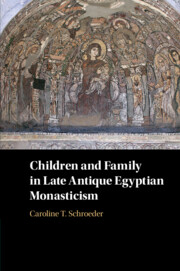Book contents
- Children and Family in Late Antique Egyptian Monasticism
- Children and Family in Late Antique Egyptian Monasticism
- Copyright page
- Dedication
- Contents
- Figures
- Acknowledgments
- Abbreviations
- Introduction
- Part I Finding Children
- Part II Representations
- Chapter 3 Homoeroticism, Children, and the Making of Monks
- Chapter 4 Child Sacrifice
- Chapter 5 Monastic Family Values
- Part III A Social History
- Bibliography
- Index of Ancient Sources
- Index of Names and Subjects
Chapter 5 - Monastic Family Values
The Healing of Children
from Part II - Representations
Published online by Cambridge University Press: 18 September 2020
- Children and Family in Late Antique Egyptian Monasticism
- Children and Family in Late Antique Egyptian Monasticism
- Copyright page
- Dedication
- Contents
- Figures
- Acknowledgments
- Abbreviations
- Introduction
- Part I Finding Children
- Part II Representations
- Chapter 3 Homoeroticism, Children, and the Making of Monks
- Chapter 4 Child Sacrifice
- Chapter 5 Monastic Family Values
- Part III A Social History
- Bibliography
- Index of Ancient Sources
- Index of Names and Subjects
Summary
Monastic culture often represents children as problems, as barriers to the ascetic endeavor. We might be tempted to conclude that early Egyptian monks had no “family values” – that they were anti-family. Yet the literature of family (and child) renunciation exists alongside numerous literary accounts of monks healing sick children. This chapter argues that such accounts constitute a thread in Egyptian monasticism that construed children as symbolizing the future, as representatives of familial and cultural legacies. Early Egyptian monasticism shared this understanding of children and family with the larger Roman world. Monasteries, in their care for sick or demonically possessed children, acted as agents in the support and continuation of traditional families as well as the health of children. Thus, monasteries – communities of celibate ascetics – guaranteed the regeneration of Christian families.
- Type
- Chapter
- Information
- Children and Family in Late Antique Egyptian Monasticism , pp. 112 - 124Publisher: Cambridge University PressPrint publication year: 2020

